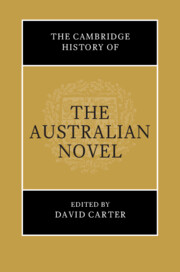Book contents
- The Cambridge History of the Australian Novel
- The Cambridge History of the Australian Novel
- Copyright page
- Contents
- Figures
- Contributors
- Acknowledgements
- Introduction
- 1 The Global Invention of the Australian Novel
- 2 Colonial Adventure Novels
- 3 Beyond Britain and the Book
- 4 Transnational Optics
- 5 The Novel in the Late Colonial Period
- 6 Love Is Not Enough
- 7 The Australian Crime Novel, 1830–1950
- 8 The Novel Nation
- 9 Selling Australian Stories to the World
- 10 Women Writers and the Emerging Urban Novel, 1930–1952
- 11 The National Trilogy and Mining
- 12 Nation and Environment in the Twentieth-Century Novel
- 13 Henry Handel Richardson, Christina Stead and the Transnational Fiction of Provincial Development
- 14 The Mid-Century Australian Novel and the End of World History
- 15 Race, Romance and Anxiety
- 16 Whiteness, Aboriginality and Representation in the Twentieth-Century Australian Novel
- 17 When the Twain Meet
- 18 From Bunyip to Boom
- 19 Unsettling Archive
- 20 The Novel at Arms
- 21 ‘Our Least-Known Best Seller’
- 22 Writing, Women and the Australian Novel
- 23 White Lies
- 24 The Economics of the Literary Novel
- 25 Mabo, History, Sovereignty
- 26 Indigenous Futurism
- 27 The Regional Novel in Australia
- 28 Children’s and Young Adult Literature
- 29 Grunge, Nation and Literary Generations
- 30 The Making of the Asian Australian Novel
- 31 Screening the Australian Novel, 1971–2020
- 32 Australian Fantasy, Crime and Romance Fiction in the Twentieth and Twenty-First Centuries
- 33 Uncertain Futures
- 34 A (Sovereign) Body of Work
- 35 The Novel Road to the Global South
- 36 The Fortunes of the Miles Franklin
- 37 The Arab Australian Novel
- 38 Riddling the Nation
- 39 Migrant Writing and the Invention of Australia
- Selective Bibliography: Studies of the Australian Novel, 2000–2021
- Index
21 - ‘Our Least-Known Best Seller’
Alan Yates and Australian Pulp Fiction
Published online by Cambridge University Press: 28 June 2023
- The Cambridge History of the Australian Novel
- The Cambridge History of the Australian Novel
- Copyright page
- Contents
- Figures
- Contributors
- Acknowledgements
- Introduction
- 1 The Global Invention of the Australian Novel
- 2 Colonial Adventure Novels
- 3 Beyond Britain and the Book
- 4 Transnational Optics
- 5 The Novel in the Late Colonial Period
- 6 Love Is Not Enough
- 7 The Australian Crime Novel, 1830–1950
- 8 The Novel Nation
- 9 Selling Australian Stories to the World
- 10 Women Writers and the Emerging Urban Novel, 1930–1952
- 11 The National Trilogy and Mining
- 12 Nation and Environment in the Twentieth-Century Novel
- 13 Henry Handel Richardson, Christina Stead and the Transnational Fiction of Provincial Development
- 14 The Mid-Century Australian Novel and the End of World History
- 15 Race, Romance and Anxiety
- 16 Whiteness, Aboriginality and Representation in the Twentieth-Century Australian Novel
- 17 When the Twain Meet
- 18 From Bunyip to Boom
- 19 Unsettling Archive
- 20 The Novel at Arms
- 21 ‘Our Least-Known Best Seller’
- 22 Writing, Women and the Australian Novel
- 23 White Lies
- 24 The Economics of the Literary Novel
- 25 Mabo, History, Sovereignty
- 26 Indigenous Futurism
- 27 The Regional Novel in Australia
- 28 Children’s and Young Adult Literature
- 29 Grunge, Nation and Literary Generations
- 30 The Making of the Asian Australian Novel
- 31 Screening the Australian Novel, 1971–2020
- 32 Australian Fantasy, Crime and Romance Fiction in the Twentieth and Twenty-First Centuries
- 33 Uncertain Futures
- 34 A (Sovereign) Body of Work
- 35 The Novel Road to the Global South
- 36 The Fortunes of the Miles Franklin
- 37 The Arab Australian Novel
- 38 Riddling the Nation
- 39 Migrant Writing and the Invention of Australia
- Selective Bibliography: Studies of the Australian Novel, 2000–2021
- Index
Summary
Alan Yates was a mid-century Australian crime-writing sensation, writing more than 300 books over a career that spanned the late 1940s to the mid-1970s. Writing under the pseudonym of ‘Carter Brown’, he was published in thirty-five countries, including the United States, where his books were released by the Signet imprint of the prestigious New American Library, and his work was translated into twenty-seven languages. Yet he is now largely forgotten and, despite his impressive sales, received little recognition in Australia even at the height of his success. The lack of critical recognition afforded to Yates’s efforts largely flows from the fact that he wrote faux American mysteries and private detective fiction for Horwitz Publications, one of the largest and most dynamic of a group of Sydney pulp publishers that emerged in Australia after 1945. Yates’s career is an excellent lens through which to examine Australian pulp publishing’s operations in the context of other successful pulp authors, including its interactions with international publishing markets, as well as the author’s complex relationship with mainstream publishing, literary fashions and notions of authorial reputation in mid-century Australia.
Keywords
- Type
- Chapter
- Information
- The Cambridge History of the Australian Novel , pp. 354 - 368Publisher: Cambridge University PressPrint publication year: 2023

